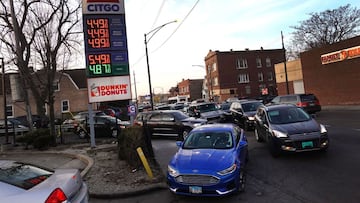Free gas in Chicago suburbs: can this measure reach other states?
The so-called gas stimulus check has been getting a lot of attention given the soaring price of a gallon of gasoline as other financial relief is sought.


After what we saw in Chicago on Thursday, Americans around the country are desperate to know what discounts, benefits or even more philanthropic acts can help them reduce their gas bill and keep their tank filled.
Chicago drivers get free gas: what happened?
The reason for the long lines of cars at Chicago gas stations was thanks to Willie Wilson, a businessman who has attempted to run for local and national office. He was offering drivers up to $50 of gasoline at more than 40 stations and some drivers were happy to wait over an hour for the gift, getting in before Wilson’s limit of $1 million was reached.
This was the second time that 73-year old had undertaken his gas freebie as prices have begun to rise, doing so across ten station on 17 March. Although there were some problems that time around - both from angry motorists as well as conservationists for different reasons - this venture appears to have passed peacefully.
A Chicago businessman is paying for drivers to fill up their tanks at more than 40 gas stations around the city.
— Bloomberg Quicktake (@Quicktake) March 25, 2022
The average gas price in the U.S. on Thursday was $4.35 a gallon https://t.co/H0TAfJ4Cde pic.twitter.com/JbyzUnfdbC
Wilson, who is a self-made millionaire, has provided donations to the community before, including offering money to homeowners struggling with their property tax bills, although he is yet to be voted in to any office. As far as we’re aware, no other states have reported this free gas giveaway, but maybe Chicago’s example can lead the way during such troubling times for some.
Gas prices in the US: what is happening?
In recent weeks the price of gasoline has soared across the United States as the steep inflation rates combined with the fallout from the Russian invasion of Ukraine to put the squeeze on motorists. In recent days the average price of a gallon of gas in the US reached $4.32, breaking the previous record and it remains around $1.37 higher than the average price one year ago.
Estimates from Yardeni Research suggest that the increase could cost the typical household around $2,000 per year, a disaster for low-income individuals and families still reeling from the economic consequences of the pandemic. To help mitigate the huge price rise, two groups of lawmakers has proposed versions of a ‘gas stimulus check’ – financial support designed to ensure that Americans can afford to pay for gasoline.
The Gas Rebate Act
The first of the two proposals to have gained traction in Congress is the Gas Rebate Act, put forward by Reps. Mike Thompson of California, John Larson of Connecticut and Lauren Underwood of Illinois. Their suggestion would see recipients receive an energy rebate of $100 per person each month, for as long as the national average remains above $4 per gallon.
A press release posted on Rep. Thompson’s website even compares the programme to the Economic Impact Payments, more commonly known as stimulus checks, and states that the eligibility requirements would be the same. The full $100 would be available for individuals earning less than $75,000, and joint filers with an annual income of less than $150,000.
The energy rebate bill I introduced with @RepThompson and @RepJohnLarson would deliver relief to hard-working families and help them afford the rising cost of gas.
— Rep. Lauren Underwood (@RepUnderwood) March 23, 2022
I am committed to lowering costs for families so that they don’t have to worry about the essentials. pic.twitter.com/npmHDhEktJ
Thompson said of the proposal: “Americans are feeling the impact at the pump of Vladimir Putin’s illegal invasion of Ukraine, and right now we must work together on commonsense policy solutions to ease the financial burden that my constituents are feeling.”
The Big Oil Windfall Profits Tax
Many progressives have drawn attention to the fact that the continued high cost of gasoline is no longer reflective of the price of oil, which has lowered substantially in recent days. The likes of Sen. Bernie Sanders has claimed that the continuation of high gas prices is a result of corporate greed on the part of the oil companies.
To address this, the Big Oil Windfall Profits Tax aims to levy an additional tax on oil companies, the profits of which would then be distributed amongst consumers. The legislative proposal was put forward by two Democrats, Rep. Ro Khanna of California and Sen. Sheldon Whitehouse from Rhode Island.
Related news
- Gas stimulus check: is there a chance that the proposal will reach Congress?
- How is the price of gas, oil and electricity set in the United States?
- Where does the gas that the United States imports come from?
The amount on offer to recipients would vary based on the cost of gasoline, as the proposed tax is only levied against the profits made by the fuel companies. However the estimate that is the price of oil remains at $120 the tax could raise $45 billion over the course of the next 12 months, equating to a $240 annual payment for each individual.
Related stories
The purpose of the bill is more to encourage gas companies to bring down the price of gasoline rather than to hand out federal money to compensate for their excessive profits.
Rep Khanna said in a statement: “This is a bill to reduce gas prices and hold Big Oil accountable. As Russia’s invasion of Ukraine sends gas prices soaring, fossil fuel companies are raking in record profits.”

